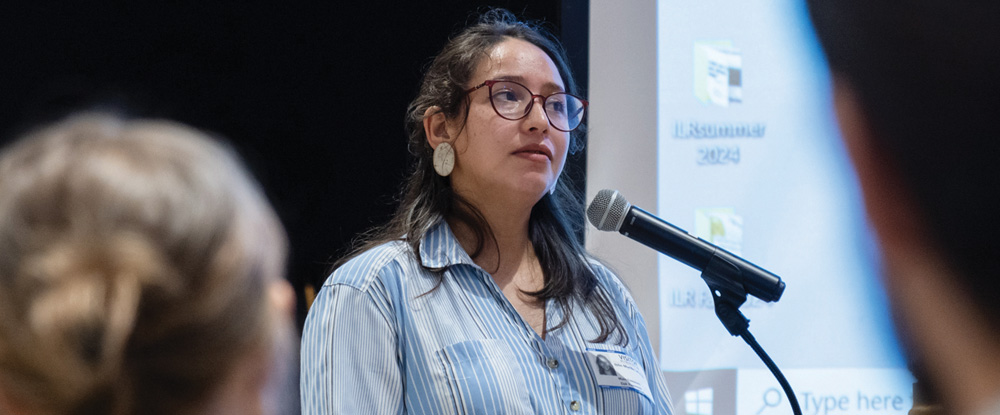Since 2021, the center has offered an annual summer course for the Institute for Learning in Retirement at Oak Hammock. Aimed at bringing humanities scholarship into the community, these courses demonstrate how depth of knowledge enlightens conversations. This year’s theme “Emerging Research in the Humanities,” highlighted the innovative research being conducted by Rothman Doctoral and Faculty Fellows. Presentations spanned a diverse array of topics including women’s activism, jury construction, gender roles in Latin American democracy, and representations of Africans in the early 20th century.
The series kicked off in July with a presentation by I. Edelweiss Murillo Lafuente, a doctoral student in sociology whose work centered around the intersection of disability, gender, and activism in the Global South. Her talk focused on the efforts of Las FemiDiskas, an anti-ableist feminist collective formed by women with disabilities and their allies in Bolivia. Lafuente’s ethnographic participatory research highlighted how this grassroots organization employed virtual engagement strategies to combat ableist and sexist violence in both private and public spaces, particularly during the COVID-19 pandemic.
Joseph Angelillo, a doctoral student in history, continued the series by discussing his research on the origins and evolution of racially representative juries during Reconstruction. His work explored the complexities of jury construction and provided a nuanced understanding of historical and contemporary issues of racial representation in the judicial system.
The third speaker of the series, Juliana Sanin, delivered a presentation addressing relationships between gender roles, political violence, and democratic processes in Latin America. Sanin, an assistant professor of political science, underscored the crucial role of women in shaping political landscapes and resisting violence. Alyssa Cole, an assistant professor of African American studies, continued this focus on women’s political empowerment through her research on Black women’s medical activism in early 20th-century Kansas City. Cole’s work showcased the significant contributions of Black women in advocating for medical reforms and addressing health disparities.
The series concluded with a presentation by Mosúnmólá Omówùnmí Adéòjó, a doctoral student in English, whose research focused on the representation of Africans at the 1922 Church Missionary Society Exhibition. Adéòjó’s work explored the fluidity of racial identities and performance, providing a fitting thematic conclusion to the series by bridging past and present through a critical analysis of racial narratives and their lasting impact.
By drawing connections between past scholarship and emerging research, the series demonstrated how humanities scholarship can inform our perspectives on current social challenges and offer valuable insights for navigating real-world complexities, underscoring their enduring relevance
